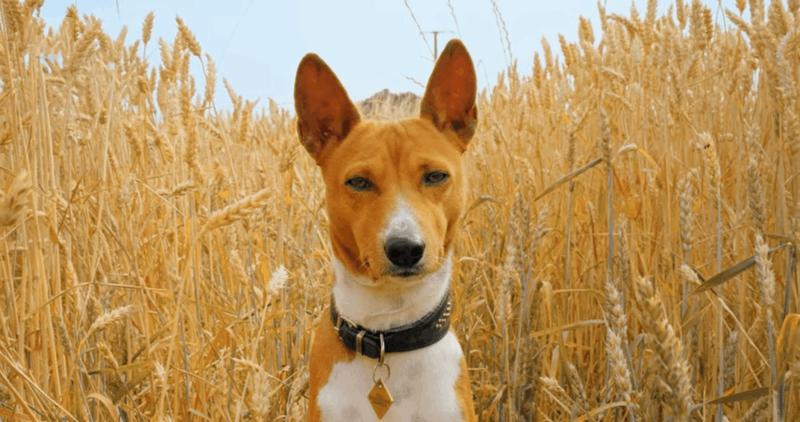No products in the cart.
Experiencing a loss of appetite in dogs can be worrying for pet owners, as it often signals an underlying health issue or discomfort. Understanding the causes and solutions for this issue is so necessary. CBD, which has attracted interest as a potential treatment for canine health issues, is an ideal choice.
We’ll discuss loss appetite in dogs in this blog, as well as how CBD may improve dogs’ general health and well-being. By understanding the connection between loss of appetite and CBD dog health, you can make informed decisions about your furry friend’s care.
Dog Lost Appetite: What does It Mean?

Loss of appetite in dogs or it can be understood that the dogs are not interested in eating or have a decreased desire for food. An underlying problem or health concern may be indicated by this change in behavior. It’s important for dog owners to pay attention to changes in their dog’s appetite as it can indicate various conditions or illnesses.
The Reasons Loss of Appetite in Dogs
Loss of appetite in dogs can be caused by various factors. Some common reasons include
- Illness or infection: When dogs are unwell or have an underlying medical condition, they can experience a loss of appetite Infections, gastrointestinal issues, respiratory infections, kidney disease, and other illnesses can affect their appetite.
- Dental problems: Gum disease, tooth decay, or oral tumors are some of dental issues that can cause pain or discomfort while eating, leading to a loss of appetite in dogs.
- Emotional or behavioral changes: Dogs are sensitive animals, and changes in their environment, routine, or emotional state can impact their appetite. A dog may become uninterested in food due to stress, worry, despair, or grief.
- Medication side effects: Loss of appetite in dogs is one of the side effects that certain medications can have. If a dog has recently started taking new medications, it’s possible that they may affect their desire to eat.
- Recent vaccinations or medical treatments: Some dogs may experience a temporary loss of appetite following vaccinations or specific medical treatments.
- Age-related factors: Older dogs may have a decreased appetite due to age-related changes in their metabolism or underlying health conditions commonly seen in senior dogs.
- Dietary changes or preferences: Because dogs can be fussy eaters, they may become less hungry if their food is suddenly changed or a new diet is introduced. Additionally, some dogs may simply have preferences for certain flavors or textures.
- Environmental factors: Dogs are highly influenced by their surroundings. Moving to a new home, the presence of unfamiliar people or animals, or a disruption in the daily routine are some of the changes in the environment that can affect the appetite in dogs.
It’s important to consider these potential causes and consult with a veterinarian if a dog’s loss of appetite persists or is accompanied by other concerning symptoms. A proper diagnosis can help identify the underlying issue and determine the appropriate treatment.
The Symptoms of Dog Loss of Appetite
Based on the underlying cause the symptoms of loss of appetite in dogs can differ, some common signs to look out for include
- Decreased interest in food: Dogs with a loss of appetite will show a reduced desire to eat. They may approach their food bowl but quickly lose interest or walk away without eating.
- Refusal to eat: Dogs may completely refuse to eat, even when offered their favorite treats or food. They may turn their head away from the food or push the bowl away.
- Behavioral changes around mealtimes: Dogs with a loss of appetite may exhibit unusual behavior during mealtimes. They may display disinterest, act restless, whine, or appear anxious around their food.
- Weight loss: If a dog constantly avoids eating, weight loss can occur over time. It’s important to monitor your dog’s weight to identify any significant changes.
- Lethargy: Dogs with a reduced appetite may seem more lethargic or have decreased energy levels. They may be less willing to engage in physical activity or play.
- Changes in water intake: A decreased appetite can also affect a dog’s water intake. They may drink less water than usual, leading to dehydration if not monitored.
- Vomiting or diarrhea: Dogs that lose their appetite may also have vomiting or diarrhea. These digestive issues may be a symptom of a deeper disease or condition.
- Changes in behavior: Loss of appetite in dogs can sometimes be accompanied by changes in behavior. They may become more irritable, exhibit decreased social interaction, or show signs of discomfort or pain.
It’s important to note that the symptoms listed above can be indicative of various health issues, and a loss of appetite should not be ignored. For a correct diagnosis and the best course of action, it is best to visit a veterinarian if your dog exhibits a chronic loss of appetite or if other alarming symptoms appear.
Dogs with No Appetite: Is It Harmful to Dogs?
A temporary loss of appetite is not usually harmful to dogs, but prolonged or severe loss of appetite can have negative consequences. Dogs need proper nutrition to maintain their health and energy levels. A dog may have weight loss, nutrient deficiencies, weakness, and a weaker immune system if they go for an extended amount of time without eating.
If the issue persists for longer than 24-48 hours, it’s critical to address the underlying reason of the loss of appetite and seek advice from a veterinarian. Prompt veterinary attention is especially crucial if other symptoms accompany the loss of appetite or if the dog’s condition deteriorates.
Home Remedies for Dog Appetite

To find a proper diagnosis and treatment plan with loss of appetite in dogs, consulting with a veterinarian is needed, however, there are some home remedies that may help stimulate their appetite.
- Warm up the food: Heating your dog’s food slightly can enhance its aroma and make it more appealing. However, ensure that it’s not too hot and always test the temperature before serving.
- Add tasty toppers: To add flavor and encourage your dog to eat, sprinkle a little quantity of bone broth, low-sodium chicken broth, or shredded cheese on top of their food.
- Offer small, frequent meals: Instead of providing one or two large meals, try offering smaller portions throughout the day.
- Opt for wet or moist food: Wet or moistened dog food can have a stronger smell and be more palatable for dogs. You can mix a small amount of water or low-sodium broth into their dry food to increase moisture content.
- Try hand feeding or interactive feeding toys: Hand feeding your dog can provide extra attention and encouragement to eat. Alternatively, using interactive feeding toys or puzzles can make mealtime more engaging and stimulating for your dog.
- Minimize distractions: Create a calm and quiet environment during mealtime to help your dog focus on eating. Remove any potential distractions, such as loud noises or other pets, that may interfere with their appetite.
- Ensure a clean and comfortable eating area: Ensure that your dog’s feeding area is tidy and devoid of any overpowering smells that can make them reluctant to eat. Provide a comfortable and easily accessible spot for them to eat.
- Regular exercise: Regular physical activity can help stimulate your dog’s appetite. Take them for walks or engage in playtime to help increase their interest in food.
Keep in mind that these home remedies are not a substitute for veterinary care. Pet owners should seek veterinary advice for safe and effective treatment if the dog’s loss of appetite persists or is accompanied by other concerning symptoms.
Does CBD Help with Appetite?

There is limited scientific research on the effects of CBD specifically on loss of appetite in dogs. CBD‘s impact on appetite regulation may be not well understood, although it has been studied for its potential therapeutic properties.
Consulting with a veterinarian who has knowledge of CBD use in animals is so important if you are considering using CBD for your dog’s appetite. They can provide guidance on appropriate dosing, potential interactions with other medications, and ensure the overall well-being of your dog.
The Benefits of Using CBD for Loss of Appetite in Dogs
The potential benefits of using CBD for loss of appetite in dogs include
- Increased appetite stimulation: CBD may help stimulate the dog’s appetite by interacting with the endocannabinoid system. Some dog owners have reported that CBD supplementation has resulted in increased food intake and improved appetite in their pets.
- Reduction of underlying pain or discomfort: Dogs may experience a loss of appetite due to pain or discomfort caused by certain medical conditions. By reducing pain and discomfort, CBD may help restore the dog’s appetite.
- Improved digestion: CBD has been reported to have positive effects on the digestive system. By improving digestive health, CBD may indirectly support a healthier appetite in dogs.
- Anxiety and stress management: Dogs can experience anxiety or stress that leads to a decreased appetite. By promoting relaxation and reducing anxiety levels, CBD may help alleviate stress-related appetite loss and improve food intake.
- Enhanced overall well-being: By supporting the endocannabinoid system, CBD may help regulate various bodily functions, potentially including appetite regulation. This overall improvement in well-being may contribute to a restoration of the dog’s appetite.
To establish the effectiveness and safety of CBD for appetite stimulation in dogs further studies are necessary, although some anecdotal evidence and preliminary research suggest these potential benefits. A veterinarian who has experience with CBD use in animals should be consulted to ensure proper dosage, product quality, and overall suitability for your dog’s specific needs.
How CBD Can Help Increase Appetite in Dogs?
CBD may potentially help increase appetite in dogs through various mechanisms. Here are some potential ways CBD can play a role
- Interaction with the endocannabinoid system: CBD interacts with the body’s intricate network of receptors known as the endocannabinoid system (ECS), which is present all over. The ECS plays a crucial role in regulating various physiological processes, including appetite.
- Stimulation of serotonin receptors: It has been demonstrated that CBD interacts with the brain’s serotonin receptors. By influencing serotonin receptors, CBD may help regulate appetite and improve food intake.
- Reduction of stress and anxiety: Stress and anxiety can contribute to a decreased appetite in dogs. By promoting a sense of calm and reducing anxiety in dogs, CBD may indirectly help restore appetite in dogs affected by stress-related appetite loss.
- Anti-inflammatory effects: In numerous research, CBD has proven to have anti-inflammatory qualities. By reducing inflammation, CBD may help alleviate any discomfort or pain associated with inflammatory conditions, potentially restoring the dog’s appetite.
- Regulation of digestive processes: CBD has been reported to have positive effects on the digestive system. By promoting a healthier digestive system, CBD may indirectly support a healthier appetite in dogs.
It is essential to remember that CBD should not replace proper veterinary care and a thorough evaluation of the underlying cause of the dog’s loss of appetite. Effective management and therapy depend on locating and addressing the fundamental cause.
Is It Safe and Effective to Use CBD for Appetite in Dogs?

Using CBD for loss of appetite in dogs can be considered safe and potentially effective, but it’s important to approach its use with caution and consult with a veterinarian. And please remember that individual responses can vary, and the underlying cause of the decreased appetite should be identified and addressed through proper veterinary care.
When using CBD, it’s crucial to choose high-quality products specifically formulated for pets, ensure proper dosage, and monitor your dog’s response. Additionally, potential interactions with medications and the avoidance of THC content should be considered. Consulting with a veterinarian experienced in CBD use for pets is recommended to ensure safety and effectiveness.
Conclusion
Loss of appetite in dogs is a concerning issue that can indicate an underlying health problem. It’s crucial to choose high-quality CBD products specifically formulated for pets and CBD should not replace a thorough evaluation of the underlying cause of the loss of appetite in dogs. By working with a knowledgeable veterinarian and considering CBD as part of a comprehensive approach, you can potentially support your dog’s appetite and overall well-being.
Hello, I am Hazel Bennett, an experienced copywriter specializing in the fascinating topic of CBD for dogs. With a passion for pet wellness and extensive knowledge of CBD’s potential benefits, I am here to provide you with informative and engaging content.



